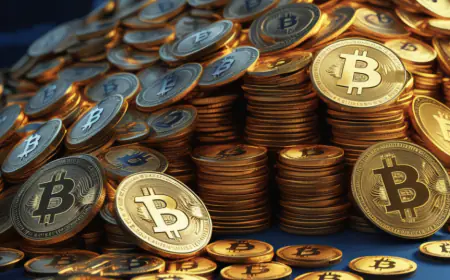Getting a campaign email every 15 minutes? Here’s how that happens
Columnist Teri Sforza gets hit by both campaigns that want her money, and maybe even her vote.

Forget what they say! Money can buy you love!
“I will always love you,” the email from Donald J. Trump declares. “Why? Because you never stopped loving me!”
Then he asks for $15.
Campaign contributions to the Trump-Vance ticket can get me a golden Trump flag pin (“everybody wants these”), the “Never Surrender” MAGA hat, the Elon Musk “Dark MAGA” hat, the limited edition GOLD MAGA hat, the original red MAGA hat, a signed MAGA poster, the Dark MAGA mug, the official limited edition campaign mug and/or the “Fear Not” mug (“I need you to know one thing: I love you!” that email says).
Wow. In the hundreds of emails we’ve gotten from Kamala Harris, she has yet to declare her deep affection for us personally. And there’s just not much swag on offer. She tends to stick to things like the latest polling numbers and her status as underdog and the kitschy pitch for $47 — because she would be the 47th president. Cute!
Which is not to say there aren’t emotionally satisfying pitches from the Harris campaign. That distinction goes to Scout, Tim Walz’s dog.
“I’m not supposed to beg, so I’m humbly asking you to chip in $25,” it says, explaining that Scout was abandoned in a box as a puppy and was skittish until the Walzes adopted him and taught him love. “I learned how to play frisbee when Tim throws it. I learned how to order a pup cup on summer drives to the local Dairy Queen. I learned how to accept those different from me, like my cat sister Honey (I even learned how to steal food from her bowl). Because of Tim, I know people are good.”
Welcome to Campaign 2024! How many of you have earned the fabulous privilege of being relentlessly courted by both sides in this presidential election? We’ll explain in a minute how that happens, but first, let us welcome you to our experiment.
See, for most of this campaign season, we’ve deleted these annoying emails the instant they appeared. But the volume got so oppressive that we decided to stop and let them pile up.
We’ve logged some 1,200 pitches from the two presidential campaigns in just the last three-plus weeks — which doesn’t include hundreds upon hundreds of desperate pleas for cash from far-flung congressional races. Or the text messages that go straight to spam.
It averages out to about one pitch every 15 or 20 waking minutes, depending on how long you sleep. The two campaigns had raised more than $2.5 billion as of last month. Good grief! It’s enough to make one pine for mercifully short, publicly funded elections.
The onslaught
Are you a no-party preference voter? Have you conscientiously voted in every election? Do you have an email address and participate in the 21st century’s digital economy?
These things are part of why you’re targeted. You might be in that crucial sliver of undecided voters. You might still be persuaded.
“Data about potential voters — who they are, where they are, and how to reach them — is an extremely valuable commodity during an election year,” the Electronic Frontier Foundation explains in its primer. “And while the right to a secret ballot is a cornerstone of the democratic process, your personal information is gathered, used and sold along the way.”
Political campaigns use the same tricks that other advertisers use, pulling data from various sources to create a profile of you.
It starts with real-world stuff: public voter records that include your party registration, address and how frequently you vote. If you’ve participated in, or contributed to, earlier races, your info gets forwarded along. Same with petitions you might have signed outside the grocery store.
Also, online. Campaigns use data brokers to get consumer information tracing our shopping habits, hobbies and demographics, EFF says. Brokers compile information from browser cookies, web beacons, mobile phones and social media platforms. Then they hire targeting firms to feed ads to us.
Open Secrets found that political groups paid 37 different data brokers at least $23 million in 2020.
Those ads you see on Facebook and Google? Slightly different beasts, EFF says. Those companies don’t need to use data brokers; they’ve amassed gobs of data on their users, and sell political ads based on that data. Combined, more than $1 billion was expected to be spent on political ads on these platforms this year.
There are things you can do to lighten your digital footprint, including disabling your phone advertising ID and “audit your location” settings; opting out of tracking on your TV, streaming devices and streaming services; refraining from clicking on links in political messages; and do a “privacy checkup” on your social media accounts. Details on how to do that are at https://bit.ly/4eMkeaJ.
Do they know me?
We wonder how much the campaigns really went through to get our humble information. Perhaps they cheaped out and just scraped the web for email addresses; we’ve been getting doubles of a lot of them, because they’ve got both our ocregister.com and our scng.com email addresses (both work, and arrive at the same place).
“I was shot!” Trump says. “I’M STILL STANDING! And it’s all thanks to Teri!”
“Congrats, you’re invited to Mar-a-Lago! Teri, I’m personally inviting you to my home because you mean so much to me.”
“Teri, Teri!” “Teri, PLEASE!”
Despite Trump’s proclaimed love, we’re not sure he entirely gets us. “I’m SICK of listening to vicious lies from the FAKE NEWS MEDIA,” one of the recent missives says.
“It’s not about the money, Teri,” he assures us.
Harris, meanwhile, lags on the swag. The only thing we’ve been offered in exchange for our contributions is a “FREE sticker” — for our first $30 donation. “These stickers are running out fast! Don’t wait to get yours,” the email says.
We were invited to kick in $25 for a chance to win an “all-expenses-paid trip to our exclusive Get Out the Vote Concert,” and to kick in $30 to enter the “Click with the Candidates” sweepstakes (where we might get to meet Harris and Walz and have our picture taken).
Exclusive hot dish recipes from the Walz family kitchen were available for $30 or “whatever feels right” (“We can’t win this election on an empty stomach”), and Second Gentleman Doug Emhoff copied us on his “Happy birthday honey” email to Harris — awww! — asking us for that $47 birthday present.
“Can I call you?” another Harris missive says. “If you chip in your first contribution of $30 – or any amount – to our campaign today, the next time you pick up the phone, I could be on the other line.”
In a twist, some missives don’t ask for money: They ask for volunteers. “Every single door knock, phone call, and social media post is a meaningful contribution to this campaign, and we’re counting on you to join us,” they say.
The message from both campaigns seems to be: DONATE NOW! IT’S ALMOST OVER!
Almost. Over. We. Can’t. Wait.
What's Your Reaction?









































































































